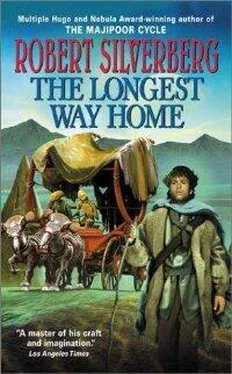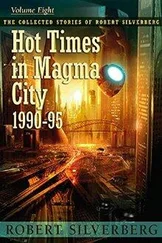He had grown very thin, also. He had always been active and athletic, and his build was naturally long-limbed and slender, but the privations of his trip and a diet made up mostly of meat and fruit had melted from him what little fat there was, and he was beginning to worry about the loss of muscle and bone. When he pinched his skin he felt nothing between his fingers but the skin itself. The various villages did not begrudge him food, but it did not appear to put any flesh on him. He had no access to mirrors here, but he could feel what was happening to his face, the cheeks becoming gaunt and drawn, the bones standing out sharply. He was gaunt all over, mere skin and bones. He knew he must look like a wild man. Though he attempted periodically to trim his hair, since Masters did not wear their hair long, he knew it must by now be an uncouth shaggy mane. His beard, which he also tried ineffectually to trim, had turned coarse and thick, a black pelt that covered most of his face to a point high up on his cheeks. No one would recognize him, he knew, if he were to be miraculously transported back to Keilloran House right now. They would run from him in fright, screaming.
The odd and disturbing thing was that as he grew thinner, his appetite, which had always been so voracious, seemed to be diminishing. He rarely felt hungry any more. Whatever they gave him to eat seemed to suffice. He had to force himself to swallow more than he really wanted, and sometimes, against all logic, he did not succeed. He had become light, very light, so light that he felt it would be no great task to kick himself free of the ground and go floating up into the sky, drifting like an untethered balloon above the clouds. That was an interesting fantasy, but it was also a bad sign that such thoughts were entering his mind. They were a sign of hallucinatory delusion, perhaps. He needed to keep his strength up, to build himself back toward whatever might be the minimum level he would need to carry him across the thousands of miles that stood between him and home.
Two more trades and he was in the foothills of what unquestionably must be the mountains of the region known as Middle Manza. It was still the rainy season, and there was a coating of snow on the distant peaks. The air was not only cooler but thinner here, so that his heart worked harder with every step he took and quickly began to pound, and he often had to pause to catch his breath as he moved about in a village. There were dizzy spells, too. One time Joseph thought he was going to faint. How much of his present weakness and lack of appetite was the result of the altitude and how much from loss of weight, he could not say.
When I come down out of these mountains, he promised himself, I will try to eat more and regain my strength. Whatever it is they give me to eat, I will eat all of it, and then I will ask them to let me have some more.
The world of Masters and Folk seemed very far away in these hilly parts. The kinds of farming that were practiced in the lowlands were difficult if not impossible in this harsh rocky terrain, and though occasional settlements had been attempted, it looked as though most of the region had been left untouched. There were no modern highways here, no dams, no cities, no Great Houses. Sometimes Joseph would catch sight of curling white plumes of smoke far away, rising from what he suspected were the chimneys of a Folkish village along the edge of some high slope. He had heard that in remote rural districts like these there had always been places where the Folk still lived apart from the modern world, lived as they had before the Conquest, simple farmers and hunters unaffected by the presence of Masters. They might occasionally have contact with outsiders but had never become part of the world’s economic system. Joseph never was brought close enough to any of those smoke-plumes to determine whether his guess was correct, though. For the most part the foothill zone, where it was inhabited at all, was inhabited by Indigenes, dwelling as always in little widely separated villages.
He was shifted from one village to another every few weeks. Each shift brought him into higher territory: the air was no longer cool but cold, almost painfully so, and white cloaks of snow now could be seen not just on far-off peaks but along the summits of the hills overlooking the villages themselves. There seemed to be relatively less work for him to do here than in the lowlands, as if, perhaps, these mountain Indigenes were a hardier breed than their cousins below. The price that was being paid for him diminished as he was shuffled along through the mountains: a few handfuls of beads and some mangy mats were enough now to buy him. But his buyers did still seem to understand that he was a human being in transit, that they were supposed to keep him for only a little while and then pass him along to the next tribe to the south.
They rarely spoke to him, in these villages. The farther Joseph got from the Indigenes of the north, who had lived in the territory between House Getfen and House Ludbrek and were at least accustomed to having glancing contact with Masters, the less responsive the villagers became to him in general. It was inescapably clear that he was simply a commodity to them, an itinerant medicine-man, something to be traded from village to village according to the rhythms of the villagers’ own needs. They did not perceive themselves as having any direct transaction with him. He barely seemed even to exist for them. Somehow he had lost human status in their eyes, whatever human status might actually mean to them. It had actually been interesting to live among the northern Indigenes, not just a fugitive but also an observer studying the folkways of this intelligent and appealing race, but that was over, now. He had passed into some new realm of being in which he was practically inanimate, a thing to be bought and sold like a stack of furs. It made for a stark, frighteningly lonely existence. More than once Joseph awoke to find himself in tears.
Most of their communication with him, always minimal at best, was carried out by means of gestures. More and more they gave him the impression that they did not expect him to understand their language, and even when he showed them that he did, that impression did not appear to be dispelled. His words barely registered on them, and they would go right back to using gestures the next time. But otherwise most of them treated him reasonably well, giving him plenty of food and decent lodgings. In one village, when they saw how badly he was taking the chill of the mountain air, they provided him with a mantle of dark furs to wrap around himself, and let him keep it when they sold him onward to the adjacent tribe a little while afterward.
The trouble was that he did not think he was moving southward any longer. The weather was still so rainy, or sometimes snowy, that Joseph rarely got a clear enough view of the sky to work out much sense of the direction he was traveling in. But it seemed to him now that they had begun to sell him sidewise, shuttling him back and forth over the crest of these hills according to the lie of their own villages rather than in accordance with any need of his own, and his calculations appeared to show that there was never much change in latitude.
“I am going south,” he told them, when his time was up at the next village. “I am returning to my family in the southern continent.” But where he happened to want to go was no concern of theirs. “Do you understand me?” he said. “I must go south.” They crossed their arms at him. They understood what he was saying, perhaps; but they did not care. This was the other side of that placid Indigene indifference. They felt no resentment over the conquest of their entire world by humans, perhaps, but they owed no obeisance, either. The next day, when they set out with him to take him his newest home, the route that the wagon followed led unmistakably east.
Читать дальше












